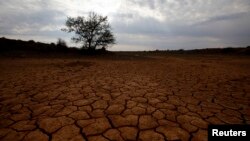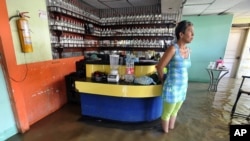A new scientific report released by the World Bank finds that as the planet warms, the heat waves and other climate extremes that have been occurring once every 100 years or so would become the “new normal.”
And it warns, the world is on a path to heat up by two degrees Celsius above pre-industrial levels. That threshold experts say will trigger irreversible change on a large scale.
The new report is the third in a series of World Bank studies called Turn Down the Heat: Confronting the New Climate Normal.
World Bank Vice President and Special Climate Envoy Rachel Kyte says the pollution from fossil fuels that has been added to the atmosphere during the past three decades has now “locked in” a 1.5 degree Celsius rise in temperature by mid-century.
“That means that there is very little we can do about that and so we have to be able to adapt and build resilience to that,” Kyte said. "That 1.5 degrees is going to have profound impacts on the development opportunities of countries all over the world."
Heat waves threaten food security
The report focuses on three regions: Latin America, the Western Balkans and Central Asia and the Middle East. What they have in common is the risk posed by heat extremes. Kyte says in Latin America, the study predicts that all aspects of the economy will suffer.
“In agricultural productivity, this could see a 70 percent reduction in soybean yield and a 50 percent reduction in wheat yield by 2050. For an economy structured the way Brazil’s is, this would have enormous impacts.”
In other parts of the world, the warming trajectory will affect water resources. Kyte points to Central Asia and the Western Balkans, where accelerated glacier melt and a shift in the timing of water flows raise the risk of torrential floods and the amount of water available when it is needed in the summer months for crops.
“This will have an impact on agricultural productivity, on rural livelihoods, on urban living and in fact on security of the whole region.”
Water scarcity
The findings for the Middle East and North Africa also describe threats to water security. Kyte says some parts of the region will face an expected 40% reduction in rainfall by 2040.
“Now what that means is that you’ll have extreme heat in cities," she said. "You’ll have an impact on agricultural systems. And so what we eat and how we eat it, who gets to eat will all be affected. And this will have an exacerbated impact on what is already a water stressed region of the world.”
Kyte says the world cannot continue down the current path of unchecked, increasing emissions. Reversing the trend will take political will, something she will be watching for next month as representatives from 200 countries gather in Lima, Peru, for critical negotiations on a new global climate treaty.





